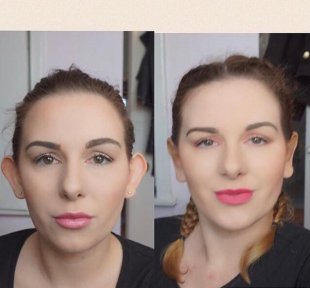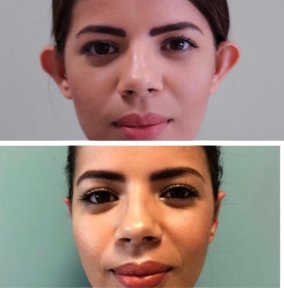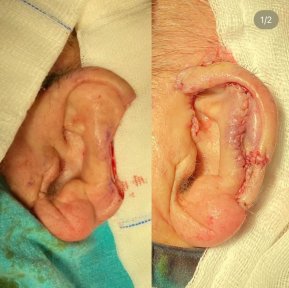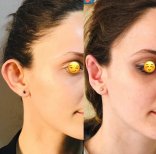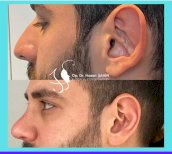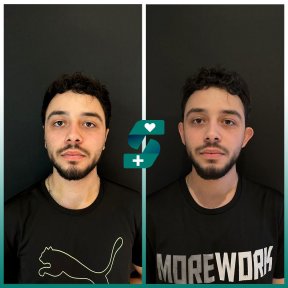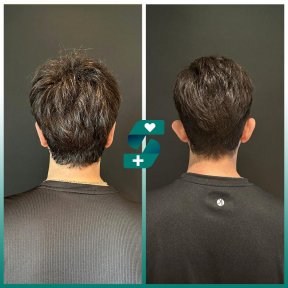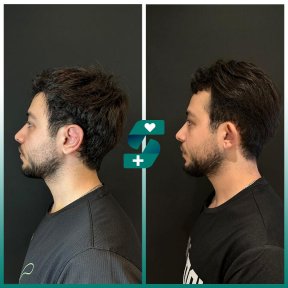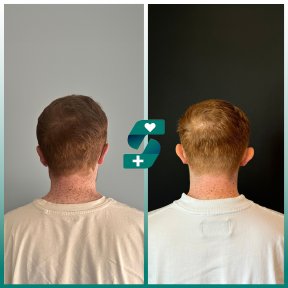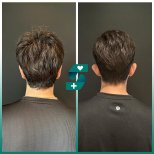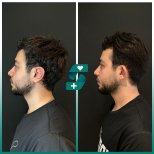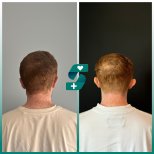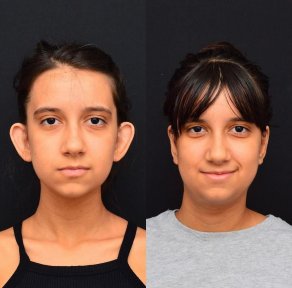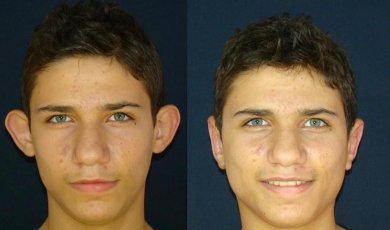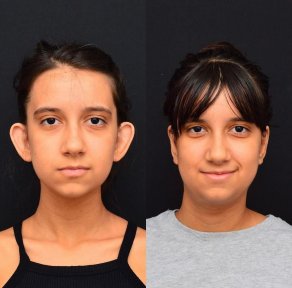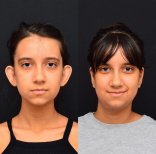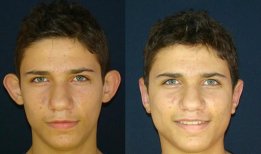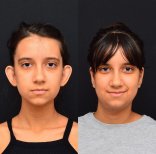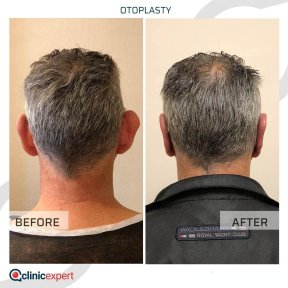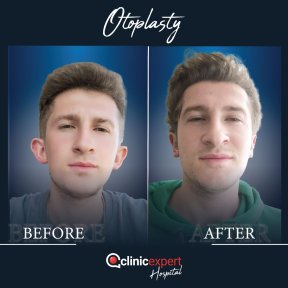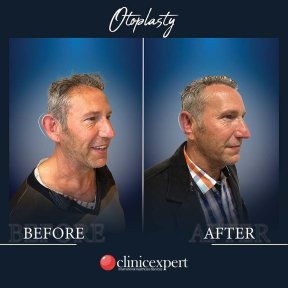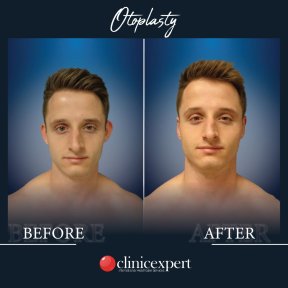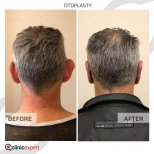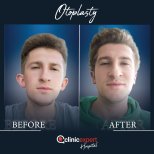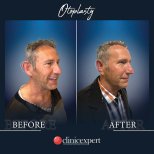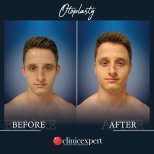Istanbul Aesthetic Plastic Surgery Center is a top-rated Turkish clinic for aesthetic, plastic and dental procedures, hair transplant, and Brazilian butt lift, offering the latest methods such as Vaser liposuction, FUE and DHI hair transplants, PRP therapy for hair loss treatment. You can find the best specialists for Otoplasty (ear surgery) in Turkey like Prof. Gürhan Özcan, who has 35 years of practical experience and is a leading plastic surgeon in Istanbul. The clinic offers all-inclusive packages for the procedure, including consultation with a plastic surgeon, compression garments, consultation with an anesthesiologist, post-op medications, and blood tests. Thousands of patients have chosen İstanbul Aesthetics for plastic surgery and have left great reviews. Visit Istanbul Aesthetic Plastic Surgery Center to learn more and book an appointment with Prof. Gürhan Özcan.
What Is Otoplasty?
Otoplasty, also known as ear reshaping surgery, is often perceived as reconstructive or cosmetic procedure that changes the ears’ size, shape, or position. It is done to correct:
-
Sticking out ears.
-
Asymmetrical ears where one ear is bigger or positioned differently.
-
Birth defects.
-
Injuries.
-
Misshapen ears.
-
Big ears (macrotia).
-
Previous unsuccessful surgeries that need revision.
Otoplasty addresses various types of ear deformity, significantly impacting individuals' quality of life.
👉Adults and children have otoplasty in Turkey to boost their self-confidence and facial balance. 90.6% of parents say their children’s quality of life improved after otoplasty.
Types and Techniques of Ear Correction Surgery
Turkey offers various otoplasty techniques, from traditional surgical methods to modern minimally invasive approaches.
| Type of otoplasty | What it fixes | Best for |
| Ear pinning (setback otoplasty) | Brings out protruding ears closer to the head. Ear pinning surgeries help to avoid psychological distress in children. | Adults & children over 5. |
| Ear reduction surgery | Reduces the size of large ears (macrotia). Aims to improve ear shape, size, and symmetry. | People with oversized ears. |
| Ear reconstruction | Corrects congenital deformities or trauma-related injuries. | Birth defects, accidents. |
| Incisionless otoplasty | Reshapes ear cartilage without visible scars. | Mild ear protrusion. |
| Revision otoplasty | Corrects bad results from previous surgery. | Patients needing corrections. |
💡 Incisionless otoplasty in Turkey is a scar-free option for those looking for subtle reshaping.
Comparison with Other Procedures
Otoplasty is often compared to non surgical ear reshaping, but only surgical otoplasty gives permanent structural correction.
| Procedure | Invasiveness | Results | Recovery time |
| Otoplasty surgery | Moderate | Permanent | 1-2 weeks |
| Ear fillers (non-surgical otoplasty) | None | Temporary (6-12 months) | Immediate |
| Earlobe repair | Low | Permanent | 1 week |
👉 Turkey ear pinning surgery is the most effective solution for protruding or asymmetrical ears.
Otoplasty serves both cosmetic and functional purposes, using reconstructive surgery techniques to address congenital deformities or injuries.
A study by Haytoglu et al. on 47 patients found incisionless otoplasty had a 94% satisfaction rate, 4% complication rate, and a 45-minute procedure time. While effective, its long-term durability is less proven than traditional methods (95-98% success rate).
Who Is a Candidate for Otoplasty in Turkey?
Otoplasty is a great option for those who want to reshape or reposition their ears.
✅ Best candidates include:
- Individuals with prominent, asymmetrical, or oversized ears.
- Children over 5 years old and adults wanting long-term correction.
- Those in good health with realistic expectations.
❌ Otoplasty may not be suitable for:
- People with ongoing ear infections or medical conditions that affect healing.
- Patients with severe bleeding disorders.
- Those expecting instant perfection (some natural asymmetry remains).
💡A consultation with the best otoplasty surgeon in Turkey determines suitability.
How Is Otoplasty Surgery Performed?
| Step | What happens? |
| Consultation | The surgeon evaluates ear structure & discusses goals. |
| Anesthesia | Local or general anesthesia ensures a painless procedure. |
| Incision & reshaping | Cartilage is reshaped, reduced, or repositioned. |
| Closure & bandaging | Stitches secure the new shape, and bandages protect healing ears. |
⏳ Surgery duration: 1-2 hours per ear, with same-day discharge.
Recovery and Rehabilitation After Ear Surgery
Recovery from otoplasty in Turkey is fast and easy with proper care.
✅ Recovery timeline:
| Day | Procedure & Recovery Plan |
| Day 1 | Arrival in Istanbul, airport pickup, consultation & pre-op medical tests. |
| Day 2 | Otoplasty surgery under general/local anesthesia, 1-night hospital stay if required. |
| Day 3 | Discharge from the clinic, recovery begins. |
| Day 4-5 | Follow-up checkups, recovery at hotel. |
| Day 6-7 | Final consultation & clearance for travel. |
⏳ Healing Timeline:
✔ 1-2 weeks: Swelling & bruising subside, patients can return to work.
✔ 4-6 weeks: Most recovery is complete, compression bandage worn at night.
✔ 3-6 months: Final results fully visible as tissues settle.
Best post-op care tips:
-
Sleep with your head up to reduce swelling.
-
Wear a headband for healing.
-
Avoid strenuous activities for 4-6 weeks.
Is Otoplasty Surgery in Turkey Safe?
Otoplasty in Turkey is safe and has low risks, but complications can occur, as with any surgical procedure.
👉For example, The cartilage-sparing, suture-based otoplasty technique, used on 91 ears, demonstrated a low 1.1% revision rate and minimal complications. Avoiding cartilage scoring or removal reduces the risk of permanent damage while achieving natural, aesthetically pleasing results.
Common side effects:
-
Temporary swelling & bruising.
-
Mild numbness or pain.
❌ Rare complications:
-
Infection (preventable with care).
-
Asymmetry that requires revision surgery.
-
Cartilage shifting over time.
💚Choosing the best otoplasty Turkey clinics minimizes risks. Bookimed works only with verified clinics.
Results: When to Expect the Effect?
Patients can count on the instant improvement even though the final shape becomes prominent in 3-6 months.
✔ Results last forever unless further trauma.
👉 Some patients may require revision otoplasty if cartilage shifts or results are unsatisfactory.
Why Get Otoplasty in Turkey?
Thanks to affordable prices, skilled surgeons, and top-rated clinics, Turkey is a top choice for ear reshaping surgery.
- ✔️ Save up to 70% with the otoplasty in Turkey cost compared to the US & UK.
- ✔️ Expert surgeons with ISAPS, EBOPRAS, and TSPRAS certifications.
- ✔️ World-class hospitals, many JCI-accredited for international standards.
- ✔️ All-inclusive packages with hotel stays, VIP transfers, and post-op care.
- ✔️ Easy travel with visa-free entry or a quick e-visa.
- ✔️ Recover in a beautiful destination—enjoy Turkey’s sights, food, and culture.
Preparing for a Trip to Turkey for Otoplasty
Here’s a guide to help you plan your trip smoothly.
Visa & stay:
-
Many nationalities have visa-free entry or e-visa.
-
Stay 4-5 days for surgery and post-op check-ups.
Payment & currency:
-
Clinics accept Turkish Lira, Euros, and USD.
-
Credit cards & bank transfers.
How Much Is Otoplasty For Both Ears In Turkey?
Otoplasty in Turkey offers unbeatable value, ranging from $1,000 to $3,500. Patients can save up to 70% on the otoplasty Turkey price, making it an ideal destination for those seeking affordable cosmetic procedures.
For example, if a patient opts for ear pinning surgery, which costs $1,500, they save $6,500 compared to the upper price range in the United States and $2,900 compared to the UK.
🎁The comprehensive packages in Turkey add further savings, keeping the overall otoplasty cost in Turkey low.
| Country | Cost Range | Savings in Turkey |
| Turkey | $1,000 – $3,500 | |
| United States | $3,000 – $8,000 | Up to $6,500 (50–70%) |
| United Kingdom | $3,100 – $4,400 | Up to $2,900 (40–60%) |
| Canada | $2,500 – $5,000 | Up to $3,500 (50–60%) |
| Australia | $3,000 – $6,000 | Up to $4,500 (50–65%) |
💚 Transparent pricing with Bookimed:
✔ Patients pay directly at the clinic.
✔ No hidden fees—official price lists only.
How much is otoplasty for one ear?
A single ear correction costs 30-50% less than a bilateral procedure.
What’s Included in Otoplasty Packages?
Most Turkey otoplasty packages offer a stress-free medical journey, covering everything from consultations to aftercare.
| Included Services | Additional Services (Varies by Clinic) |
| Consultation with a board-certified surgeon. | Bundled procedures (rhinoplasty, facelift, hair transplant, etc.). |
| Preoperative tests (blood tests, ECG, chest X-ray if needed). | Luxury accommodation upgrades. |
| General/local anesthesia. | PRP therapy for faster healing. |
| Otoplasty surgery (ear pinning, reshaping, or reduction). | Post-op lymphatic drainage massages, |
| Hospital stay (1-2 nights, depending on the clinic). | Personalized compression garments, |
| Postoperative medication & aftercare. | Tourism add-ons (sightseeing, cultural tours). |
VVIP airport-clinic-hotel transfers. |
|
| VIP airport-clinic-hotel transfers |
📌 Some clinics also offer combined procedures, such as otoplasty + hair transplant or otoplasty + rhinoplasty at discounted rates.
References
-
Songu M., Kutlu A. Long-term psychosocial impact of otoplasty performed on children with prominent ears. The Journal of Laryngology & Otology. 2014. Vol. 128, no. 9. P. 768–771. URL: https://doi.org/10.1017/s0022215114001662 (date of access: 06.03.2024).
-
Comparison of two incisionless otoplasty techniques for prominent ears in children / S. Haytoglu et al. International Journal of Pediatric Otorhinolaryngology. 2015. Vol. 79, no. 4. P. 504–510. URL: https://doi.org/10.1016/j.ijporl.2015.01.014 (date of access: 06.03.2025).
-
Cartilage-Sparing Otoplasty – A New Approach / M. Benkler et al. Plastic & Reconstructive Surgery. 2023. Publish Ahead of Print. URL: https://doi.org/10.1097/prs.0000000000010401 (date of access: 06.03.2025).
